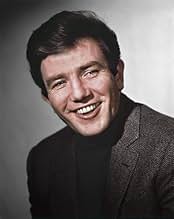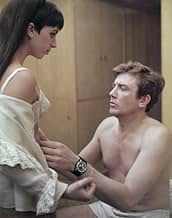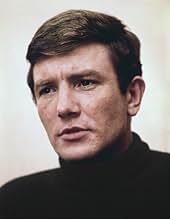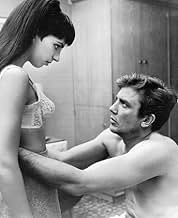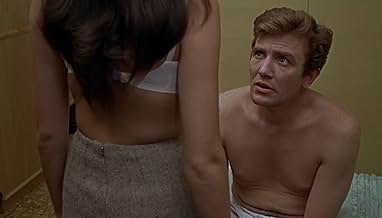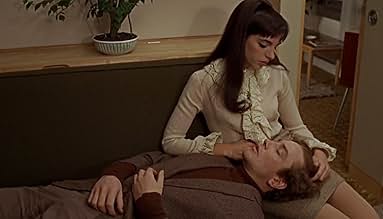CALIFICACIÓN DE IMDb
6.3/10
898
TU CALIFICACIÓN
Agrega una trama en tu idiomaA married writer has an affair with his secretary.A married writer has an affair with his secretary.A married writer has an affair with his secretary.
- Ganó 1 premio BAFTA
- 3 premios ganados en total
- Dirección
- Guionista
- Todo el elenco y el equipo
- Producción, taquilla y más en IMDbPro
Opiniones destacadas
This excellent film is about the effects of displacement, of being a fish out of water. Working-class Charlie Bubbles has ascended from his humble origins to become a successful writer. He has clearly not handled the transition well from within, but it's hardly surprising when there are so many hurdles to overcome in the world outside of himself. The story would have been familiar to a lot of people in Britain in the 60s, as the first generation to benefit from the post-WW2 welfare state came to adulthood. CHARLIE BUBBLES nails this more effectively than any other film I know. Playwright Shelagh (A TASTE OF HONEY) Delaney's script is full of acute observation; the acting is marvellous, the cinematography (by a young Peter Suschitzky, now better known as David Cronenberg's DOP) noticeably European, the charming score (by Misha Donat - Mr Suschitzky's sister) a nod to to the work of Georges Delerue and Nino Rota. Indeed, the movie as a whole leans more towards New Wave and Fellini than the realistic school in which Finney made his name as an actor. Here he is also the director - his one and only feature film in that capacity - and a very creditable achievement it is too. How CHARLIE BUBBLES reads to people unfamiliar with its social and historical background, I don't know. For me it is one of the finest British films of the sixties, but it somehow gets overlooked in the enthusiasm for THE LONELINESS OF THE LONG-DISTANCE RUNNER, A KIND OF LOVING and of course Saturday NIGHT AND Sunday MORNING. They are all fine films, but so is this one. Re-assessment in its favour is long overdue.
I think it's a classic existentialist movie, very much of the European school. Man can never be truly happy or satisfied, with what he's got or with what he gets even if all his ambitions and dreams come true.I think Albert Finney has done an amazing job. It takes true guts and real skill to make a film like this and 'get life' out of it without resorting to fist fights, car chases and shootouts. I love the small moments, like where he puts the eyelashes on his sons lip to make a 'moustache', or when his wife takes the tea cup and his acting when he reaches for it. Billie Whitelaw looks super-sexy in the film and her performance is beautiful. Her gaze at him when he's tucked in bed said more than a million lines of dialogue could. I wish Mr Finney had directed more films, if his debut as a director was this good, imagine what would have come after a few more films. Aah we'll never know...
Although the apparent unhappiness of Finney as a successfull, and rich writer might seem difficult to accept, think of all the things you thought of as beyond you as a kid. Some of the people reading these words are making a lot of money, live in a beautiful house, have a beautiful, handsome, wife, husband, and dread each new day. Some of it is good old chemical deppression, and some of it is, who the hell knows. That Finney, a working class kid, realized this at such a young age makes me respect him even more than my admiration for him as an actor. The film I feel looks back to the post WW2 Italian existential movies where very little happens. Life is almost slow motion wandering around. Witness Finney's pitiful relationship with his son and his complete lack of interest in his legal an financial affairs with his lawyers in the opening scene. The cast is wonderful. I'm sure the idea of Liza Minelli as his assistant was laughed at. Liza, playing with British pros? Are you kidding? But it works. Billie Whitelaw was born for the movies, and is incidentally Samuel Beckett's favorite actress. She has premiered many of his plays. That Julia Roberts is a superstar, and few people know who Billie Whitelaw is, says something about "something". As a personal aside, one of the great supporting character actors, the late Colin Blakely, who plays Finney's failed sidekick and I, met in front of a London theatre. I told him I came all the way from the US to tell him how wonderful I thought he was. "Did you see my show tonight", he asked. "No sir, I haven't had a chance yet", I replied. He quickly turned away, and walked in a different direction!!!!
Interesting but ultimately unmoving drama (with quirks) has the title-named character, a rich writer who lives in plushy comfort, unable to get over his guilt of having money. When Charlie visits his Northern haunts, where the streets are filled with potholes and the surroundings match the sky--all in gray--we wonder, "Why is he so obsessed with his early poverty?" and "Why can't he get on with his life?" Director-star Albert Finney doesn't give us much to go on (or maybe you have to be British to understand the symbols inherent in British society) and most of his film feels like a put-on. Liza Minnelli has a small part as an American secretary, and she occasionally pushes her kooky "Americanisms" too far; however, though the role isn't much, Minnelli has a strange, slightly zonked/slightly exotic presence, and when she performs in a low-key she's appealing. As Mrs. Bubbles, Billie Whitelaw got most of the acclaim, but it's Liza we remember. As for the much-talked about finale, I thought it profound in its fantastic way, but, like the rest of "Charlie Bubbles", it exists to please and understand itself, leaving the rest of us on the outside looking in. ** from ****
This is a surprisingly pedestrian affair from Albert Finney as he directs herself in the title role as a writer who has made plenty of money from his career. He has a lovely convertible Rolls Royce, a home with staff and a rather prurient security system and even manages the odd high-class food fight with his friend "Smokey" (Colin Blakely) but he is divorced, has a wayward young son and very little fulfilment in his life. It's on a trip to visit his former family with his secretary (Liza Minnelli) that we learn a little more about the causes of his divorce and of his new attentions as we meet ex-wife "Lotte" (Billie Whitelaw) and son "Jack" (the frequently scene-stealing Timothy Garland) and appreciate the somewhat enthusiastic interest in his visit by the local media. This has something of the stage play to it, and perhaps it might have worked better within the confines of a theatre giving it a degree more intensity. As it is, though, I found it all a rather lacklustre observation of the life of a man about whom I really didn't care. Aside from the aforementioned food fight, there is very little humour here and to be honest I was more than a little disinterested in his problems and peccadilloes by the end. Minnelli doesn't really feature enough to make that much difference although there is one rather awkward scene that is perhaps not one you'd probably ever have expected to see but that isn't really enough to kickstart or sustain this. It's all very proficiently put together but is an unremarkable ninety minutes, sadly.
¿Sabías que…?
- TriviaThis was a very personal project for Albert Finney, who made his debut as director with it and made it for his own company, Memorial Enterprises. He got fairly lavish backing from an American company, Universal, who were trying to set up a system for making films in England, but then had the greatest difficulty in getting the finished film shown. He made the film in 1966, but, although advance word on it was very positive, and the film eventually won awards as well as rave reviews, it was not shown in either the US or Britain until 1968; its American opening was well over six months in advance of its British one. Finney did his best to promote the film in several countries, but it was written off as a box-office failure. He hoped to direct in films again, and announced a film to be called "The Girl In Melanie Klein" in the early 1970s; but he never made it and never directed another theatrical feature.
- ErroresThe credits suggest that the place where Charlie and Eliza meet the airman is a cafe. It is not: places on the motorway where refreshments and fuel can be obtained are called motorway service stations in Britain.
- Citas
Charlie Bubbles: The back door was wide open. Anybody could have walked in instead of me. You might have got a sex maniac.
Lottie Bubbles: Not with my luck.
- ConexionesReferenced in Stella Street: Very Twisty Turny (2000)
Selecciones populares
Inicia sesión para calificar y agrega a la lista de videos para obtener recomendaciones personalizadas
- How long is Charlie Bubbles?Con tecnología de Alexa
Detalles
- Fecha de lanzamiento
- País de origen
- Idioma
- También se conoce como
- Charlie Bubbles
- Locaciones de filmación
- Productoras
- Ver más créditos de la compañía en IMDbPro
- Tiempo de ejecución1 hora 29 minutos
- Relación de aspecto
- 1.85 : 1
Contribuir a esta página
Sugiere una edición o agrega el contenido que falta

Principales brechas de datos
What is the French language plot outline for La máscara y el rostro (1968)?
Responda

